Is there a standard length for a trailer tongue? If not, how do you choose how long your trailer tongue should be?
This is a common topic in online forums. Everyone seems to have an opinion, but very little science to back it up. Is there an optimal tongue length for small- to medium-sized utility and RV trailers?
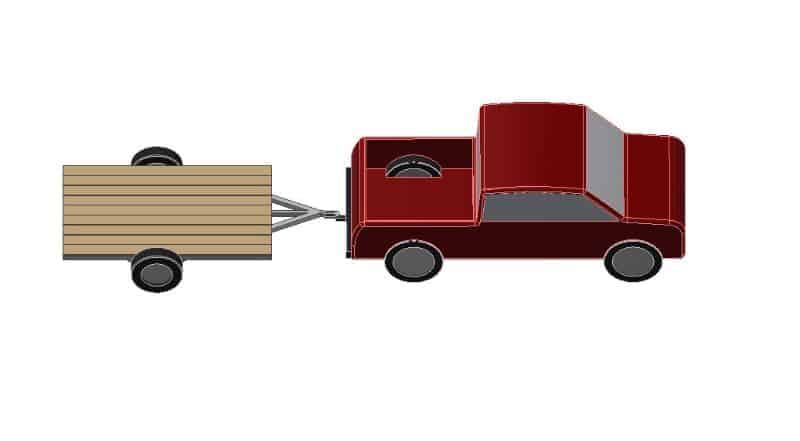
The Short n’ Sweet Answer to Trailer Tongue Length
There’s no one-size-fits-all answer for the best trailer tongue length. But if we limit our conversation to small trailers – ATV trailers, snowmobile haulers, landscaping utility trailers, etc. – then a sweet spot emerges.
Most small trailers would benefit from a trailer tongue 38 to 56 inches in length.* Within reason, longer is better. Many utility trailers find their sweet spot around 42-50”. Travel trailer tongues may be as long as 60″ to make room for propane tanks, batteries, and extra cargo space.
You can find commercial trailers with tongue lengths as short as 30-36”, but these are asking for trouble! 36” should be considered the bare minimum for most trailers. And that’s 36” from the front of the frame or the trailer body, whichever is further forward. V-nose trailers are an exception since the body parallels the base of the trailer tongue.
P.S. Not sure how to measure tongue length? It’s measured from the center of the tow ball to the center of the front frame.
Is There Such a Thing as Too Long?
Oh yes! Longer trailer tongues only improve vehicle dynamics up to a point. Excessively long trailer tongues will actually increase sway because of the reduced tongue weight.
It’s rare to find a fixed tongue longer than 60”.* Most trailers in need of super-long tongues will have folding or extendable tongue receivers.
Plus, as I discuss below, long tongues (over 60”) usually require extra bracing or heavy-duty material to prevent flexing or buckling.
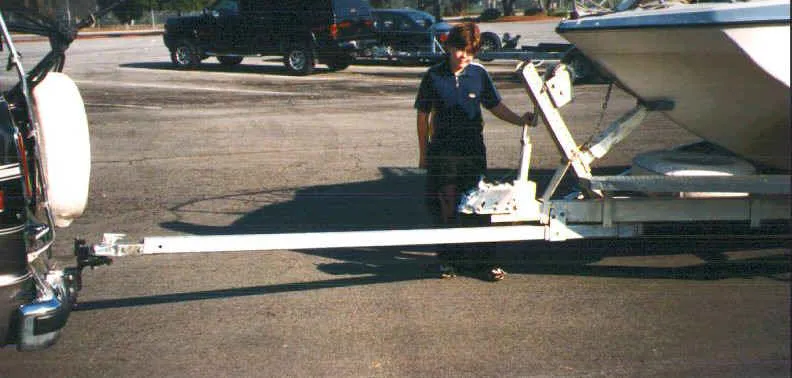
*The big exception to this rule are boat and jet ski trailers! You’ll find tongues as long as 84” (or longer!) on marine trailers in order to keep the tow vehicle out of the water when reversing down a boat ramp.
Is There Such a Thing as Too Short?
Oh yes! At a minimum, the trailer tongue should be at least as long as half the width of the tow vehicle. If your tow vehicle is 72” wide, for instance, then your tongue should be at least 36”. Otherwise, the corner of your tow vehicle can smack into the frame of the trailer on a sharp turn, as you can see below:
Advantages of a Longer Trailer Tongue Design
Decreases Tongue Weight
Riddle me this: Which of these two configurations has a lower tongue weight: a 10-ft camper with a 3-ft tongue, or a 10-ft camper with a 6-ft tongue?
Answer: The second! The one with the longer tongue.
It may seem counterintuitive, but the longer a trailer tongue, the less weight is born by the tongue/hitch! So as you increase tongue length, you decrease hitch weight. Conversely, if you decrease tongue length, you increase hitch weight.
For conventional trailers, you should aim for 10-15% of the total trailer weight to be on the tongue. Any less, and vehicle dynamics will suffer. In fact, check out this video to see how dangerous a low tongue weight can be!
Unfortunately, because utility trailers are loaded differently every time, it is very difficult to optimize tongue length for the best tongue weight.
However, if you’re building a trailer with a predictable load, like a jet ski trailer, then you can calculate the optimal length of the tongue and position of the axle to target 10-15% tongue weight.
Improves Highway Tracking and Stability
As a rule of thumb, the more separation between the rear axle of your tow vehicle and the axle of your trailer, the better the vehicle handling.
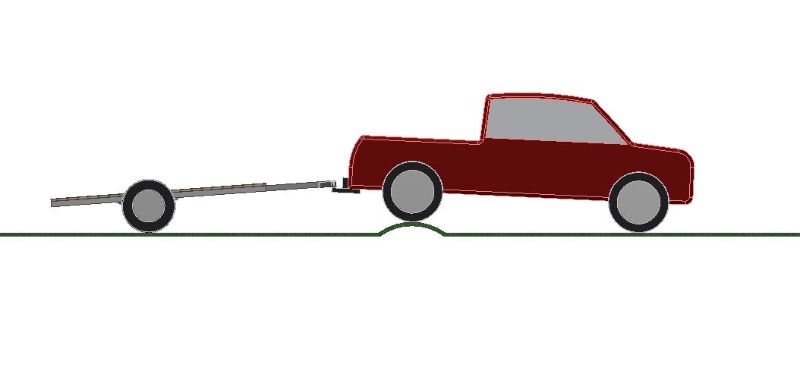
The shorter this distance, the more “squirrely” a trailer will feel at high speeds. It will be subject to swaying from crosswinds and bucking or “porpoising” over bumps. In severe cases, a bucking trailer can completely overwhelm a small, lightweight tow vehicle!
Longer trailer tongues significantly reduce fishtailing and bucking. If you plan on towing your trailer on highways, longer is better (up to a point, of course).
Reduces Jack-Knifing
Reversing a small trailer is much, much easier with a longer tongue!
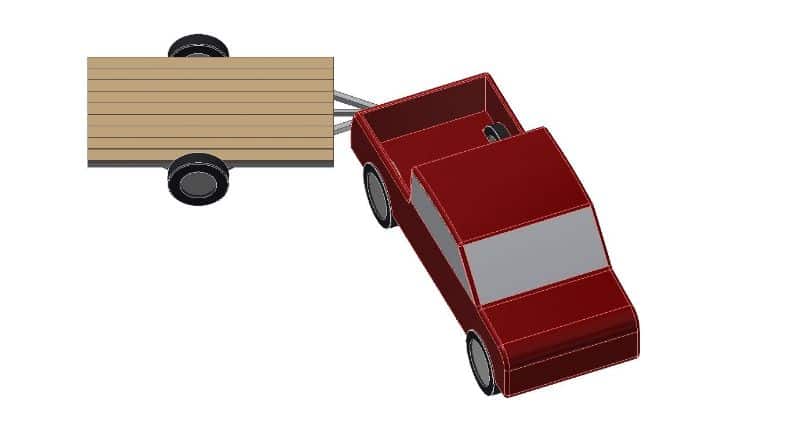
The simple explanation is that the shorter the tongue, the more responsive the trailer to changes in angle direction. In other words, small changes in direction have a big effect on a trailer with a short tongue!
More Room for Cargo
If you’re planning to store cargo on your trailer tongue, the longer, the better! Longer trailer tongues can accept spare tires, bicycles, propane gas bottles, batteries, toolboxes, etc. There’s an entire aftermarket of products designed around A-frame cargo storage; take advantage of it.
Just double-check that your tow vehicle can handle the added weight, which will mostly be borne by the tow vehicle hitch, not the trailer axle.
Easier Access to Trunk
A longer trailer tongue separates the trailer from the tow vehicle. It’s much easier to flip down a truck tailgate or lift up an SUV rear door.
Disadvantages of a Longer Trailer Tongue Design
Larger Corner Turn Radius
As you know from watching semi-truck trailers take wide corners, the greater the distance between axles, the larger the turn radius.
However, in reality, this doesn’t really come into play with most small trailers. North American roads are so wide that most small trailers, regardless of tongue length, make the turn just fine.
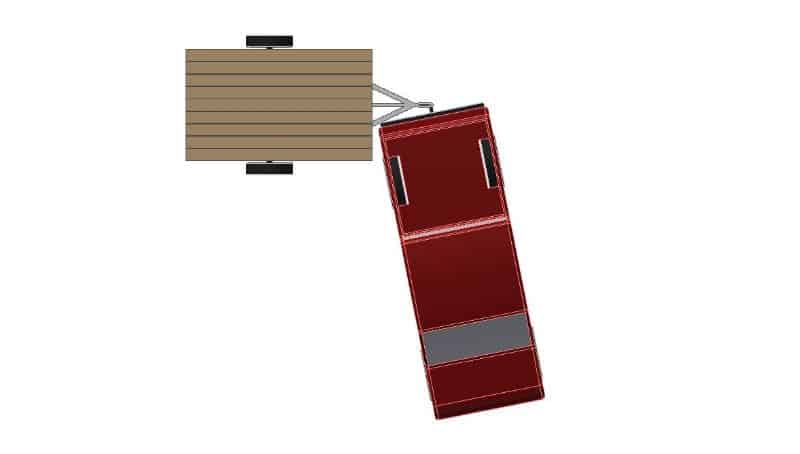
Worse for Off-Roading
If you’re building an off-road rock crawler, you are limited in just how long of a tongue you can install. An expedition trailer should follow the footsteps of the Jeep as closely as possible. With a long trailer tongue, the trailer and tow vehicle could be navigating completely different terrain at the same time!
Plus, longer trail tongues reduce your approach angle, increase your turning radius, and can increase leverage on the hitch – none of which are good for Jeep trails!
For this reason, many off-road trailers come with extendable tongues, which can be adjusted based on the terrain.
More Storage Space Required
If you plan to store your trailer indoors, you need to plan ahead! You don’t want to build a trailer that won’t fit in your garage or storage unit.
When calculating the total length of your trailer, remember to include the additional length of the coupler and any tail lights, bumpers, or ramps installed on the back of your trailer.
Increased Cost
A trailer tongue is a mechanical bridge, a lever arm, between the trailer main frame and the tow hitch. It transmits all the bumps, tugs, stops, and other forces. It’s a tough job!
One of the design challenges is that a longer trailer tongue is exponentially more likely to flex, buckle or crumple. (A full discussion of the physics is beyond the scope of this post, but take my word for it.) Many a DIY builder has discovered, to his dismay, that his tongue bent in half when towing a heavy load down a rough road.
Therefore, longer tongues must be A) built out of larger material and/or B) reinforced with additional gussets and trusses. Extending a trailer tongue, for instance, may require upgrading from 2×2” hollow steel tube to 3×2” or even 4×2” hollow steel tube!
Difficult to Find Parking
One of the benefits of a small trailer is that parking is (normally) easy! A passenger vehicle plus a small trailer normally requires two adjacent parking spots, no more.
However, a longer trailer tongue may extend your total length beyond two normal parking spots. Parking spots are normally 12-20 feet in length, with 16-18 feet being the most common. If your trailer tongue length pushes your total length past 32-34 feet, you probably won’t comfortably fit in many parking lots.
Compromised Aerodynamics
I hesitate to even include this complaint because it’s mostly theoretical. Yes, a longer trailer tongue expands the empty space between your tow vehicle and trailer, which increases turbulence in the slipstream. That (theoretically) reduces your fuel economy.
But in reality, I think this reduction is almost negligible. Utility trailers are incredibly un-aerodynamic anyway, and most things that are hauled in a trailer, even less so.
The only situations I can imagine where this reduction in aerodynamics becomes important are if you’re building a miniature camper or cargo trailer to be towed by a small SUV or crossover. Even then, I wouldn’t sweat the decision. There are more important criteria.
What If I Need a Super-Long Trailer Tongue?
There are several reasons you might be interested in an extremely long trailer tongue, such as:
- Extending your boat trailer tongue.
- Adding bicycle storage to an A-frame trailer tongue.
- Towing with an exceptionally wide commercial truck.
If you are considering a trailer tongue longer than 60’, or especially if longer than 72”, then I recommend an extendable trailer tongue.
Leave a Reply